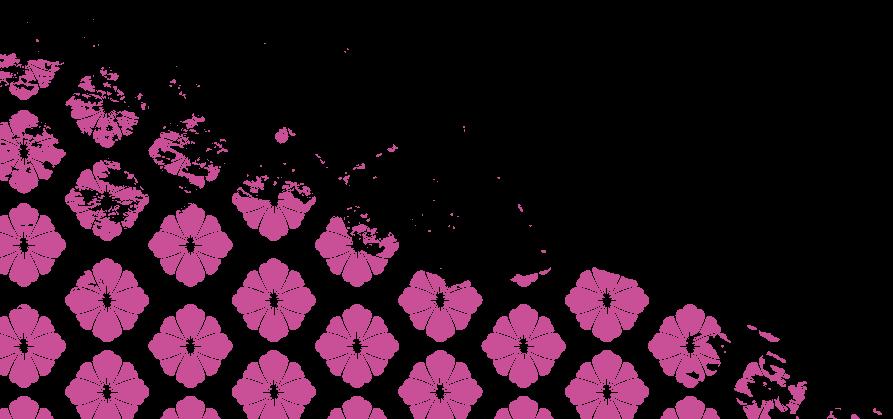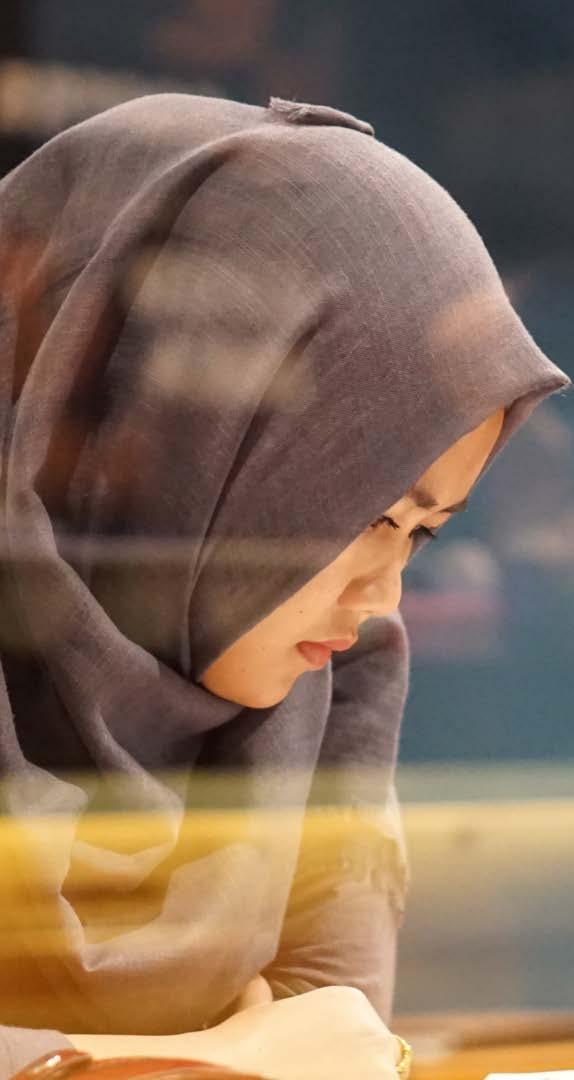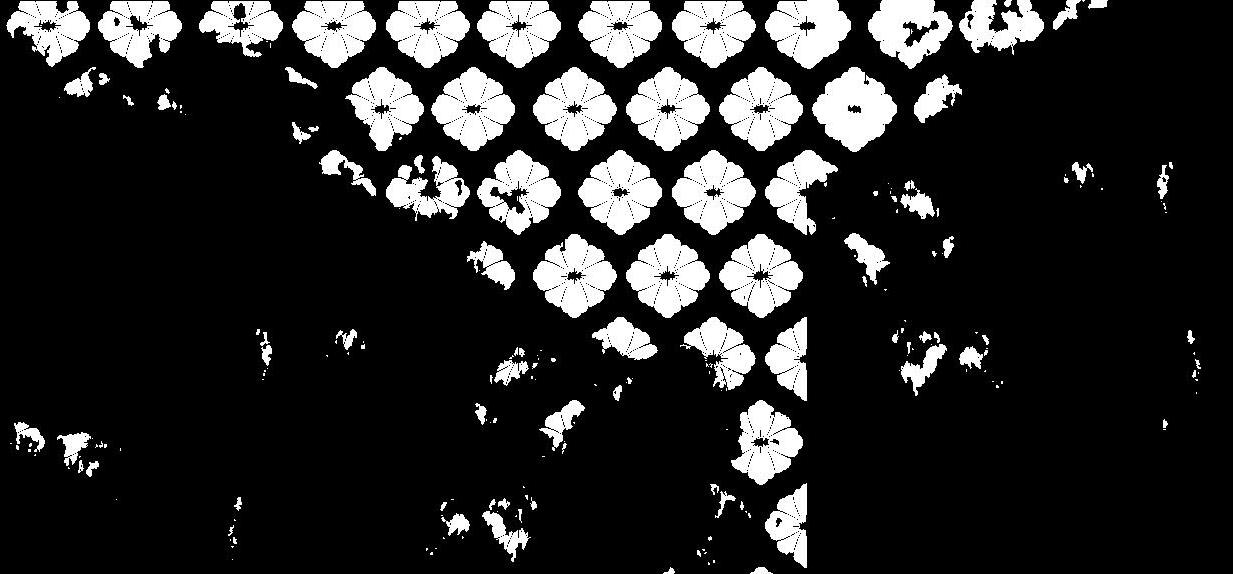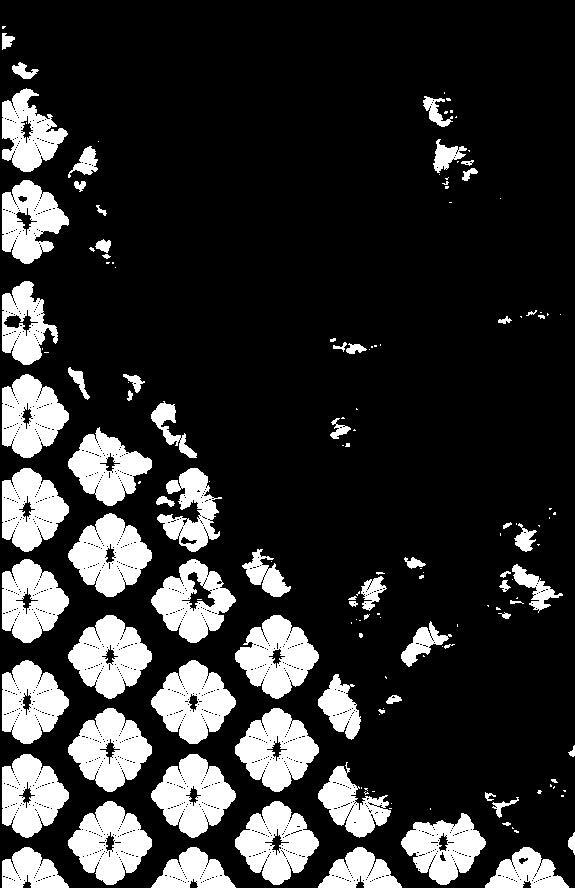RACE, MIGRATION, CRIMINALISATION AND MENTAL HEALTH:
The gendered experiences of Black, minoritised and migrant women in contact with the criminal justice system supported by Hibiscus Initiatives


Published by Hibiscus Initiatives

Resource for London, 356 Holloway Road, London, N7 6PA, United Kingdom
First published 2023 © Hibiscus Initiatives
Design: Prospectus
hibiscusinitiatives.org.uk
Twitter: @hibiscuscharity
Instagram: hibiscuscharity
This publication is copyright, but may be reproduced by any method without fee or prior permission for teaching purposes, but not for resale. For copying in any other circumstances, prior written permission must be obtained from the publisher, and a fee may be payable.
ACKNOWLEDGEMENTS
This report is dedicated to the women who shared their experiences with us. Without their generosity and openness, we would not have been able to carry out this research and share this knowledge with the world. In addition, a huge thank you to the Clinks for funding this project and for their commitment to supporting and improving the mental health experiences of Black and minoritised women in contact with the criminal justice system in the UK. The research was conducted, and report written, by Hibiscus Project Worker Priscille Manga and Naomi Nyamweya — an independent consultant for this project. Additional thanks go to Hibiscus staff, Ghadah Alnasseri, Head of Policy and Public Affairs who managed the project and production of the report. Most importantly, Hibiscus would like to once again thank the women who shared their stories and who participated in this research. The names of the women portrayed in the case studies have been changed to protect identities.



CONTENTS GLOSSARY & ABBREVIATIONS 4 EXECUTIVE SUMMARY 5 EXECUTIVE RECOMMENDATIONS 6 HIBISCUS SUPPORT DURING THE COVID-19 PANDEMIC 8 BACKGROUND 10 FINDINGS 12 MAKING SYSTEMS WORK 14 FINANCIAL INSTABILITY 18 HOW DO WE ACHIEVE FINANCIAL STABILITY? 19 HOUSING PROBLEMS 20 HOUSING RECOMMENDATIONS 21 BARRIERS TO HEALTHCARE ACCESS 22 POLICY RECOMMENDATIONS 24 ENDNOTES 25 3 HIBISCUS INITIATIVES
GLOSSARY & ABBREVIATIONS
CULTURAL MEDIATION:
Refers to the process of cross-linking cultural and social spheres, bringing together policy, cultural and social norms, and public space to build new relationships and trust. This is crucial as it helps to facilitate integration into the host society and acts as a bridge between institutions and migrants. Cultural mediation wholly addresses the need to be able to understand and to be understood outlined in the Government’s Response to the 2020 Consultation ‘Improving the Victims’ Code’.
HOSTILE ENVIRONMENT:
Umbrella term used to describe all policies which make life difficult for migrants living in the UK, more so when their immigration status is insecure, treating them as less deserving of dignity and humanity than British citizens. This includes cutting access to fundamental services including the NHS and the police and making it illegal to work and rent.
HMPPS:
His Majesty’s Prisons and Probation Services.

IN CONTACT WITH THE CRIMINAL JUSTICE SYSTEM:
Refers to women who are currently going through the criminal justice process having been suspected or convicted of an offence. This could be at any stage from being arrested, cautioned by the police, appearing at Court, through being prosecuted, to serving a prison sentence, community order, or post-release probation supervision.

NO RECOURSE TO PUBLIC FUNDS (NRPF):
Condition attached to work, family and study visas which restrict access to much of the welfare safety net for almost 1.4 million people, including 175,000 children. This includes vital benefits like Universal
4 RMC & MENTAL HEALTH
EXECUTIVE SUMMARY
Black, minoritised and migrant women in contact with the criminal justice system face complex, compounding issues including Violence Against Women and Girls (VAWG), criminalisation, financial insecurity, inadequate housing, and barriers to accessing healthcare – all of which have detrimental effects on their mental health.
The enduring effect of the COVID-19 pandemic has highlighted and exacerbated existing inequalities and injustices experienced by these women as they navigate life in the UK and the criminal justice system.
This report presents evidence of the struggles and challenges faced by our clients, the impact that these challenges have had on their mental health, and our understanding of how the Government can strengthen policies and systems to respond to their needs. The report outlines findings from a series of six open-ended focus group discussions with ten women, as well as analyses of existing literature, evidence, and policies on the experiences of Black, minoritised and migrant women in the context of the enduring impact of COVID-19, including those in contact with the criminal justice system. This is extremely timely given the recent Government’s draft Mental Health Bill, amendments made to the Modern Slavery Statutory Guidance, introducing the new Illegal Migration Bill and the Victims and Prison Bill.
We find that Black and minoritised women are disproportionately affected by violence, including physical, psychological and sexual violence, and that they often face complex barriers to reporting these crimes. Migrant women also repeatedly report experi-

ences of hyper-precarious employment and financial instability which greatly inhibits their ability to make sufficient housing arrangements for themselves and their families. Further to this, women who have been in contact with the criminal justice system are already at a disadvantage in finding stable employment and support in finding work, and since many of these women have experienced violence and may suffer from mental health issues, it can be harder for them to maintain employment and to access financial resources. Access to healthcare is another area of shared concern, hampered by a digital divide and language barriers, as well as fears of NHS data-sharing and charging. The culture of fear precipitated by discriminatory hostile environment policies creates an environment that is bad for both public health and individual mental health.
Through this report we highlight the urgent need for policy changes and propose practical solutions to address the systemic injustices and inequalities faced by migrant women in contact with the criminal justice system in the UK. By taking concrete actions to improve access to healthcare, stable employment, safe housing, and culturally appropriate support services, we can work towards a more equitable society that values the rights and dignity of all its members.
5 HIBISCUS INITIATIVES
EXECUTIVE RECOMMENDATIONS
For more detail on each recommendation please see the relevant chapter.
1 2


MAKE SYSTEMS WORK FINANCIAL STABILITY
In order to make systems work to prevent the further criminalisation of victimised Black, ethnically minoritised and migrant women, and those who may be in contact with the criminal justice system, immediately:
a) Strengthen the Female Offender Strategy Delivery Plan to better identify and support the differentiated needs of Black, ethnically minoritised and migrant women in contact with the criminal justice system.
b) Urgently amend the Nationality and Borders Act and Modern Slavery Statutory Guidance to ease identification and support of victims of modern slavery.
c) Amend the Victims and Prisons Bill to introduce statutory defences for victims of domestic abuse who are accused of offences and add a commitment to the Victims’ Code to protect all victims of VAWG from unjust criminalisation, ensuring they have their rights upheld as victims and are not stigmatised.
d) Implement a firewall to end the sharing of victims’ and witnesses’ data between the police and the Home Office for immigration enforcement purposes, as recommended by the Justice Select Committee, Domestic Abuse Commissioner and women’s sector services.
And agree and institute a process to:
e) Adopt cultural mediation as a solution to reduce the cultural and language barriers experienced by Black, minoritised and migrant women and improve the accessibility of care for them.
Read more on page 14
To create an enabling environment for the realisation of financial stability and gainful employment for Black, ethnically minoritised and migrant women, immediately:
a) End the illegal working offence and introduce a work permit system for all migrants. Over the long term:
b) Suspend the No Recourse to Public Funds (NRPF) condition.
c) The Cabinet Office, MoJ and HMPPS should adopt schemes geared towards the increased representation of Black, minoritised and migrant women in contact with the criminal justice system particularly in roles that offer the opportunity for career progression.
Read more on page 18
6 RMC & MENTAL HEALTH
3 4


HOUSING HEALTHCARE
As a means to securing safe and dignified accommodation for target populations:
a) End restrictions on the right to rent and right to work, allowing all migrants the potential to pay for their own accommodation.
b) Improve the Modern Slavery Victim Care Contract to ensure support meets the needs of migrant women survivors of trafficking.
c) Strengthen monitoring and accountability mechanisms in relation to provision of suitable accommodation for migrant women and their families. In the long term, commit to:
d) As above, abolishing the NRPF condition to allow all migrants potential access to the welfare safety net, including Universal Credit, Housing Benefit, homelessness assistance and access to social housing.
e) Investments in suitable social housing in communities for migrant women and their dependents, including increasing the availability of women-only safe house accommodation and support.
f) Working with women with relevant lived experience and specialist organisations to ensure a gender-informed, trauma-informed and culturally competent approach in delivering housing support.
Read more on page 20
In order to lower the barriers to healthcare access:
a) Provide information on the right to NHS services and their uses in a broad selection of languages.
b) Increase migrants’ and practitioners’ understanding and knowledge of the healthcare system, especially awareness of the charging exception for coronavirus and other special circumstances.
c) Provide wifi or data as a priority for people living in poverty so that they are not excluded from services as they move online.
d) Strengthen the Mental Health Bill to address the failures of the current legislation on discrimination along racial and immigration status lines. And, over the long term:
e) Train interpreters in cultural mediation and station them at GP surgeries, vaccination centres and health emergency services.
Read more on page 22
7 HIBISCUS INITIATIVES
HIBISCUS SUPPORT DURING THE COVID-19 PANDEMIC
During the Covid-19 pandemic, Hibiscus support to women in the community consisted of online activities, referrals to other organisations and 1-1 casework provided remotely by phone or video call. The support was based on:
EMOTIONAL SUPPORT
Clients were able to contact their support workers any time they felt the need to, and we actively listened to them and their concerns. Women said that they felt supported and understood by Hibiscus staff. One of the clients expressed how grateful she was to her project worker who was constantly contacting her during the pandemic.1
Anastasia from Nigeria, in her mid-fifties, already had her refugee status but facing a health condition said:
“Having a serious health condition that reduces my mobility, it became very challenging to go out even for a short walk. My Hibiscus support worker was my only contact with the outside world. Her phone calls were so uplifting and encouraging that after each conversation I felt calm and positive about the whole situation. She managed to keep me at peace because of all her explanations about the progression of the virus and the pandemic.”
WELLBEING SUPPORT
During the lockdown, clients were invited to participate in remote activities organised by the community team at Hibiscus. It was challenging for Hibiscus to organise these classes online as many of the clients had limited IT knowledge and others also struggled with their mental health. However, Hibiscus staff found innovative ways to keep the lesson as engaging as they would have been in person and kept the women in attendance.
Lorna from Jamaica, who came to UK in 2015, and a regular client since that year stated:
“I felt very good because even though the sessions were online, I met different people. It was different online, but I felt happier. My sleep was also better, especially after the yoga class.”
Classes taught included sewing, singing, IT and yoga. Hibiscus staff sent sewing machines and smartphone or tablets to clients who did not have one at home to facilitate the integration and access of them to the classes. Women responded positively to the lessons and attendance was great for such a new initiative.
From April 7 2020 – October 2021:
Hibiscus organised 329 online activities
62 clients took part
8 RMC & MENTAL HEALTH
Women who participated in these classes reported that their mental health improved.
Shun from China, who is a survivor of trafficking said:
“I felt better because my mind was occupied with something other than the disease.”
Additionally, it provided an opportunity to socialise and share and listen to other women’s experiences and challenges. It provided participants with a sense of community.
AGENCY AND EMPOWERMENT SUPPORT
Some clients were referred to organisations that offered professional counselling such as Nafsiyat Centre and the Maya Centre who could provide sessions in participants' first languages such as Albanian and Romanian. We also referred other women to safe accommodation to escape an abusive partner. There they received the support and safety needed to begin their journey towards emotional healing.
Cinzia, lady from South- Africa in her mid-thirties, who came in the UK in 2006 said:
“I finally found a safe place in this accommodation. This allowed me to work on the addictions I have developed as a result of excess trauma, to escape the pain”.
PRACTICAL SUPPORT
Hibiscus staff provided casework support and advised women on issues related to housing, immigration cases and benefits. Casework has always been an important and essential part of Hibiscus services. During the pandemic, there was an urgent need to adapt and readjust our way of delivering this service to meet the needs of the women. Casework was provided over the phone or via Zoom video conferencing, which helped us stay close to our clients’ challenges.
Ardita, a lady from Nigeria in her mid-forties, who came in the UK in 2020:
“It is a very different feeling now that my kids and I have our own space. A big thank you from the bottom of my heart goes to you for everything you’ve done for us. Thank you for the Asda Voucher. You have a golden heart as we say in Albanian when someone has a good heart like you do”.
We also had emergency Covid-19 funds that allowed us to provide essential practical help such as food, clothing, baby and children’s items, mobile top-ups, and smartphones to help our clients stay connected with their family and friends.
IN NUMBERS, HIBISCUS PROVIDED:
children’s provisions including vouchers for clothes, nappies, prams, pushchairs and medicines.
for mobile phones and internet credit.
mobile phones and tablets.
supermarket vouchers
and
for utilities and bills.
hardship support
including emergency accommodation, furniture, household essential items, gift cards, winter clothes and transport cards. 9 HIBISCUS INITIATIVES
87
149 top-ups
45
316
45 credits
funds
32 wellbeing packs 161
credits
BACKGROUND
The COVID-19 pandemic caused disruptive consequences in several aspects of life, mainly the economy, health, and education sectors.
These consequences led to an increased level of social and economic vulnerability affecting already marginalised groups such as women, migrant populations, Black and ethnically minoritised people, and those in contact with the criminal justice system.
Previous studies have documented negative mental health outcomes resulting from pandemic outbreaks such as Ebola, HIV, and Zika. Such outcomes include depression, anxiety, and post-traumatic stress affecting patients and their families.23 These studies also found that the negative impact on mental health was not limited to those in proximity to the infectious outbreak, as the general public also experienced increased fear of contagion.45 Similarly, recent evidence from a longitudinal study in the UK suggests that the mental health of participants has deteriorated significantly during the pandemic. Women of all races and Black and ethnically minoritised men experienced a higher average increase in mental distress compared to White British men.6
However, documenting the experiences and specific consequences of pandemics on groups such as migrants and refugees, who already suffer from increased psychological vulnerability, has remained a glaring gap, both during previous pandemics and with the current COVID-19 pandemic.7 This is cause for alarm as the psychosocial risks presented by a pandemic can further worsen their susceptibility to experiencing mental health difficulties. As of 2022, there were approximately 232,000 refugees in the UK.8
Similarly, while there are multiple studies that suggest a profound effect of the pandemic on the mental health of those living and working in prisons in the UK, there is a lack of depth and breadth in the qualitative evidence on the differentiated experiences of Black and ethnically minoritised women.
It is imperative to collate data and systemically record evidence of these experiences to bear witness and provide appropriate support to these populations during and after this and future pandemics.
Migrant women in contact with the criminal justice system, such as those in prison or under community supervision, already suffered from mental ill-health prior to the pandemic. Research has shown that migrants and refugees are exposed to a cumulative convergence of risk factors that can negatively affect their mental health.910 These include precarious living situations, living in socially excluded and materially deprived neighbourhoods, enduring long-lasting uncertainty about their legal status and future, and facing barriers in accessing the labour market and securing economic stability. For women and girls, their alleged offending is often directly linked to their experiences as survivors of domestic abuse and other forms of violence, as well as their insecure immigration statuses. 1112
The pandemic has intensified feelings of anxiety and fear for many migrant women and those in the criminal justice system, adding to an already perilous situation and putting their mental health and wellbeing to the test. Through this report, we present the struggles and challenges faced by our clients, the impact it has had and continues to have on their mental health, and the ways we have responded to their needs. We also present a series of recommendations to strengthen the Government’s understanding of and response to the needs of these populations. The report outlines findings from a series of six unrestricted open-ended focus group discussions with ten women, as well as analyses of existing literature, evidence, and policies on the experiences of Black, minoritised and migrant women in the context of COVID-19, including those in contact with the criminal justice system.
10 RMC & MENTAL HEALTH
METHODOLOGY
This study utilised a mixed-methods approach to gather and analyse data. This involved a series of six unrestricted focus group discussions with ten women, conducted to obtain insights of experiences and perceptions of Black, minoritised and migrant women who have been in contact with the criminal justice system, as well as those who have been affected by immigration-related issues within the context of the hostile environment and the enduring effects of the COVID-19 pandemic.

Additionally, the study involved analysis of existing quantitative and qualitative literature related to the linkages between insecure immigration status and the hostile environment and the criminalisation of
Black, minoritised and migrant women, and the effect that these issues have on their mental health. We also analysed policies relating to the specific needs of these women.
The data collected from the focus group discussions and literature review were synthesised and analysed using a thematic analysis approach, identifying and categorising themes that emerged from the data. Overall, the mixed-methods approach allowed for a comprehensive understanding of the experiences, perceptions and psycho-social well-being of Black, minoritised and migrant women in contact with the criminal justice system.
11 HIBISCUS INITIATIVES
FINDINGS
VIOLENCE AGAINST WOMEN AND GIRLS
Violence Against Women and Girls (VAWG) is widely acknowledged to affect Black, minoritised and migrant women disproportionately in the UK.13 Black, minoritised and migrant women face a wide range of abuses, including physical, psychological, and sexual violence, which are exacerbated by their race, religion, or immigration status. During COVID-19 lockdowns, Black, minoritised and migrant women faced an escalation of domestic violence, which was underpinned by psychological, physical, financial, and sexual abuse, and exacerbated by insecure immigration status and government safety measures. Respondents with spousal visas reported feeling trapped, as did those who were undocumented.

Cinzia:
“I was emotionally and physically abused daily. The situation was so desperate that at one point I was contemplating suicide.”
These women often face complex barriers to safe disclosure and reporting of violence, which include fear of retaliation, mistrust of the authorities, difficulty navigating the complex system and lack of access to culturally appropriate services. This lack of access is often due to institutional racism and a lack of diversity in mental health and social care services.14 From previous case studies with Hibiscus’ clients, we found that interpretation services offered to VAWG survivors from marginalised and traumatised migrant communities that report their experiences are insufficient. Interpreters, whose role is to passively convey messages from one language to another, are not responsible for the content of communication between two parties and therefore cannot facilitate the realisation of the right to be able to understand and to be understood. This is of paramount importance when attending to victims of VAWG since it is itself perceived in different ways in different cultures, and the criminalisation of certain misbehaviours is often interpreted differently.15
Even before the onset of the pandemic, the context of the Hostile Environment for migrant women, coupled with the threat of deportation, detention or destitution weighed them down affecting their ability to seek recourse after an episode of violence especially with an insecure immigration and ‘No Recourse to Public Funds’ (NRPF). Research carried out with Brazilian migrants in London in 2018 and 2019 by the Latin American Women’s Rights Services (LAWRS) found that over 80% of study participants had experienced some form of gender-based violence in their lifetime, and yet more than half had never reported their experiences as they lacked information, felt ashamed or feared deportation.12 13 Now, the Nationality and Borders Act, with its time limits on reporting and criminalisation of victims who are broadly considered as “threats to public order” further jeopardises opportunities for safe disclosure by migrant women who may be survivors of human trafficking.
Conversely, the conditions associated with the government’s response to the pandemic (e.g isolating and shielding women and children from others, disconnecting them from wider family and limiting their social contact) mirror the tactics deployed by perpetrators of domestic violence. The restrictions associated with the pandemic also heightened risks and increased barriers to help-seeking: for example, means and opportunity to contact services were in some cases restricted and access to support networks was limited or wholly untenable. Lockdowns raised concerns about personal safety, associated with higher levels of anxiety, depressive symptoms, and poor quality of sleep.
12 RMC & MENTAL HEALTH
Almost 30 women attempt suicide every day, and three women take their own lives every week to escape domestic abuse.15
DOMESTIC VIOLENCE AND THE CRIMINAL JUSTICE SYSTEM
Women who have experienced violence may use force in self-defence, or they may commit offences under duress, coerced by a partner or perpetrator to act in a certain way. Women who have experienced violence may also be more likely to suffer from mental health issues, such as depression, anxiety, or post-traumatic stress disorder, which can make them more vulnerable to criminalisation. And when women fear deportation, they may not report incidents of domestic violence or seek police support.
Perpetrators sometimes use false allegations as a deliberate tactic to extend their control over victims, particularly in cases of domestic violence and abuse.16 They may falsely accuse victims of crimes, such as theft or assault, in an effort to discredit them or gain an advantage in family court proceedings. This tactic is known as "perpetrator-generated allegations," and it can have serious consequences for the victims. It can lead to the victim being criminalised, further traumatised, or even incarcerated, while the perpetrator goes free.
Research has shown that there is a significant overlap between women and girls in contact with the criminal justice system and those who have experienced violence, particularly domestic violence and abuse. For example, a report by the Prison Reform Trust found that 57% of women in prison reported having experienced domestic violence, and over two-thirds had experienced emotional, physical, or sexual abuse in their lifetime. The system creates a vicious cycle where Black, minoritised and migrant women who are more at risk of experiencing violence are conse quently confronted with ill mental health, which can lead to their criminalisation. Research shows that Black, minoritised and migrant women are dispropor tionately represented in the criminal justice system, particularly in cases of mental health issues.
While there is little systematically collated and published data on the ethnicities of women in the criminal justice system, limited evidence highlights stark disparities disadvantaging Black, minoritised and migrant women. For example:
• Women from minoritised ethnic groups feel less safe in custody and have less access to mental health support.
• Some women from minoritised ethnic groups are also migrants and may be subject to immigration control and confront language and cultural barriers.
• Women belonging to minority ethnic groups have a greater likelihood of being remanded or receiving custodial sentences, and may often plead 'not guilty', thereby making themselves vulnerable to potentially severe sentencing.
• Only a few specialised organisations exist that offer support to women belonging to minority ethnic groups within the criminal justice system.17

13 HIBISCUS INITIATIVES
MAKING SYSTEMS WORK
To prevent further criminalisation of victimised Black, ethnically minoritised and migrant women
Adopting Cultural Mediation as a solution to reduce the cultural and language barriers experienced by migrant women and improve the accessibility and quality of care for them.
1. The Government must work to improve communication and understanding between the migrant population and statutory and non-statutory bodies, by adopting cultural mediation as a primary approach and tool to work with them.
a) Cultural mediation is a survivor-centred approach that is a barrier to re-traumatisation and cares for the physical and mental health of the migrant population. It is an essential and empowering tool that helps migrants heal, gain independence, and re-establish power and control over their lives (for more see: Cultural Mediation - Hibiscus Initiatives).
b) Interpretation alone when accessing services is insufficient. HMPPS and the Ministry of Justice (MoJ) must ensure that the migrant population has access to reliable, independent interpretation and translation services that take into consideration cultural and social contexts.
2. Improve knowledge and good practice when working with survivors of GBV.
a) It is important that cultural mediation, and other best-practices such as applying other trauma-informed and survivor-centred approaches, are recognised and understood on a large scale. This will require capacity building of existing service providers including:
• Working with specialised agencies and organisations to develop tools and resources that can provide vital information to the police, solicitors, the judiciary, social services, and prison and probation officers about their responsibilities and obligations in relation to Black, minoritised and migrant women. In addition, targeting migrant women to improve their own understanding of the criminal justice system.
• Informing and signposting Black, minoritised and migrant women in contact with the criminal justice system to organisations and services that are equipped to provide support in various essential areas such as financial, psychological, housing or legal support.
b) The personnel who work directly with women survivors of GBV must be trained in cultural mediation, especially interpreters, and should be available in a timely and professional manner when requested. They must respect the women’s decision on who they would like to mediate between them and the system (e.g offering female cultural mediators, when necessary, etc.)

14 RMC & MENTAL HEALTH
The Female Offender Strategy Delivery Plan
differentiated needs of Black, minoritised and migrant women in contact with the criminal justice system.
1. The FOS should include statistical measures to monitor the unequal treatment and outcomes for Black, minoritised and migrant women. This includes:
a) Sentencing disproportionalities by ethnicities for Assaults on Emergency Workers, which is likely to disproportionately impact Black, minoritised migrant women in contact with the justice, mental health, and immigration systems,
b) Disaggregated data by gender, ethnicity, race, faith, and nationality on prosecution decisions including racial disproportionality of the prosecution rate for the offences where histories of poor mental health were identified in pre-sentence reports,
c) Racial disproportionalities for Black, minoritised and migrant women when new legislation is introduced through the Police Crime Sentencing and Courts Bill,

d) Trends in relation to complaints submitted by women including Discrimination Incident Reporting Forms (DIRFs) in prison,
e) Disaggregated data on gender-based violence and its links with Black, minoritised and migrant women’s pathways into the criminal justice system.
itise ending the unfair criminalisation of victims of VAWG and transparently publish data on disparities experienced by minoritised and migrant women in contact with the criminal justice system.
15 HIBISCUS INITIATIVES
Make urgent changes to the Nationality and Borders Act, particularly the Modern Slavery Statutory Guidance to ease identification of and support for victims of modern slavery.
1. MPs should support the anti-slavery sector’s proposed amendments to Part 5 of the Nationality and Borders Act to address the following issues:
a) Time limit on reporting: Remove the clause 58 that puts pressure on victims to identify themselves within a limited timeframe, without consideration for the impact that trauma may have on the victim's ability to disclose their experiences. Experts in policing, the courts, and the anti-slavery sector agree that this clause will make it harder for victims of slavery to be identified and supported.
b) Criminalisation of victims: Remove the clause 62 that disqualifies from support any victim of modern slavery who is considered to be a "threat to public order," using a broad definition that fails to take account of the fact that many victims will be forced to commit crime as part of their exploitation (including victims of County Lines drugs gangs), or that victims can be targeted for exploitation because they have criminal convictions. This clause could result in victims of modern slavery being prosecuted instead of being recognised as victims and provided with the necessary support.
2. Ensure the victims of modern slavery are identified and supported by providing:
a) Adequate resources for law enforcement agencies, the courts, and support services to identify and assist victims of modern slavery.
b) Training for frontline professionals, such as police officers, social workers, and healthcare professionals, to recognise the signs of modern slavery and respond appropriately.
c) A victim-centred approach that prioritises the safety, wellbeing, and recovery of victims of modern slavery, regardless of their immigration status or criminal record.
Withdraw the proposals in the Illegal Migration Bill which deny the protection and support to victims of trafficking who arrive by irregular means, prevent them claiming asylum, and allow for their indefinite imprisonment.[i]
The proposals in the new Illegal Migration Bill would leave victims at increased risk of exploitation and contravene the European Convention on Action against Trafficking in Human Beings (ECAT) and the Secretary of State’s existing duty to allow victims of trafficking temporary permission to stay.
We are calling:
• MPs should withdraw from the proposals in the Illegal Migration Bill that would limit the rights of potential victims of trafficking;
• The need to collect and analyse disaggregated data to improve understanding of the criminalisation of victims of VAWG, including intersectional discrimination experienced by Black, minoritised and migrant women.

16 RMC & MENTAL HEALTH
The Victims and Prisoners Bill does not address the gaps in law and practice that can lead to the unjust criminalisation of victims of domestic abuse and other forms of VAWG and exploitation, including Black, minoritised and migrant victims.
1. Hibiscus and Tackling Double Disadvantage partnership support proposals by the Centre for Women’s Justice (CWJ) to address this by:
a) Adding new statutory defences to the Bill to provide effective defences for those whose alleged offending results from their experience of domestic abuse.
b) Ensuring the Victims’ Code includes a requirement to protect victims of domestic abuse and other forms of VAWG and exploitation from unjust criminalisation, including by addressing intersectional discrimination and inequality faced by Black, minoritised and migrant women.
Latin American Women’s Rights Service (LAWRS), Southall Black Sisters (SBS) and others to:

a) Introduce a firewall to stop data sharing between statutory agencies and Immigration Enforcement to enable victims to come forward to report abuse and seek help, as recommended by the Justice Select Committee and Independent Domestic Abuse Commissioner.
b) Extend the Domestic Violence Indefinite Leave to Remain (DVILR) and Destitution Domestic Violence Concession (DDVC) model for those on partner/spousal visas to all migrant victims of abuse regardless of their immigration status, to prevent them from being trapped in violent relationships due to no recourse to public funds.
c) Extend the current three-month provision to six months under the DDVC to give victims the ‘breathing space’ to resolve problems by seeking advice and recover from abuse, and to encourage more refuge providers to accept referrals and not turn victims away.
These proposals would have the additional benefit of reducing the risk of migrant victims’ criminalisation.
17 HIBISCUS INITIATIVES
1 The Tackling Double Disadvantage partnership consists of six charities who aim to tackle intersectional discrimination experienced by Black, minoritised and migrant women in contact with the criminal justice system: Hibiscus Initiatives, Agenda Alliance, Women in Prison, Zahid Mubarek Trust, Muslim Women in Prison Project and Criminal Justice Alliance.
FINANCIAL INSTABILITY AND HYPER-PRECARIOUS EMPLOYMENT
Financial insecurity came out strongly as a common problem faced by study group participants and interviewees.
Women who have been in contact with the criminal justice system are already at a disadvantage due to their criminal record, which can make it harder for them to find stable employment and support in finding work. Additionally, since many of these women have experienced violence and may suffer from mental health issues, it can be harder for them to maintain employment or access financial resources. This is particularly true for Black, minoritised and migrant women, who face additional barriers due to their victimised identities. The pandemic exacerbated these challenges as many industries were forced to shut or reduce their operations, leading to widespread joblosses. This often affected those in hyper-precarious employment conditions, such as low-wage work or temporary contracts more as they had little job security or financial stability.
For migrant women, even before the pandemic, No Recourse to Public Funds restrictions have pushed them into poverty, unsustainable debt, destitution, homelessness and unsafe housing. Universal Credit, the Coronavirus Job Retention (Furlough) Scheme and Statutory Sick Pay, which had been lifelines to so many in the height of COVID restrictions and the ensuing economic fallout, were not available to those with insecure immigration status. Moreover, the children of undocumented migrants were unable to access free school meals throughout the pandemic despite the fact that they were facing hunger.18 While changes were made to extend eligibility of free school meals to thousands more families with NRPF, this did not include undocumented families not in19 receipt of Section 4 or Section 17 support.
While migrants must work to earn a living, respondents indicated that the illegal working offence and ‘right to work’ check forces them into unregulated, low-paid clandestine work. All the women we spoke with had experience of working in precarious settings and in poorly regulated sectors such as care, cleaning and domestic work. Our respondents highlighted that without bargaining power, they are often left vulnerable to exploitation by employers that use their lack of status to control them. When the pandemic hit, migrants and women in contact with the criminal justice system who were already in extremely vulnerable positions and overrepresented in some of the industry's worst impacted by lockdowns described feelings of despair as well as emotional and mental turmoil.

18 RMC & MENTAL HEALTH
How do we achieve financial stability and gainful employment for target populations?
1 2 3

Suspend NRPF
Suspending NRPF is the only way to ensure that migrants do not have to choose between their own and the public’s health and being able to feed and house their families. Everyone living in the UK, whatever their immigration or employment status, must have access to public funds to ensure that we can all weather future crises.
End the illegal working offence and introduce a work permit system
All workers should be safe and protected from exploitation and abuse, regardless of immigration status. Banning undocumented migrants from working legally does not reduce the need for people to work, or to provide for themselves or their families. Illegal working offences drive undocumented migrants underground, empower exploitative employers and leave undocumented workers unable to report labour violations for fear of being reported to immigration enforcement. Instead, the Government should introduce permits that can be obtained by undocumented migrants with an offer of employment – this could then be relied upon as part of the regularisation process, as happens in other comparable countries, with potential economic benefits across the population as a whole.
Representation in government
The Cabinet Office, MoJ and HMPPS should lead by example and adopt schemes geared towards increased representation of Black, minoritised and migrant women in contact with the criminal justice system, particularly in roles that offer the opportunity for career progression. These institutions should also publish the numbers of minority ethnic women with criminal records that they themselves have recruited, retained and promoted under the Going Forward into Employment (GFIE) Scheme.

19 HIBISCUS INITIATIVES
HOUSING PROBLEMS
Due to a combination of hostile environment policies including No Recourse to Public Funds (NRPF), the illegal working offence and discriminatory ‘right to rent’ checks, migrants are more likely to live in unsafe and overcrowded housing.
This greatly inhibited their ability to self-isolate with Hibiscus’ respondents highlighting that pregnant women and women with children living in asylum accommodation were very concerned about their safety since they had to share spaces such as living rooms and bathrooms with other people.
Ardita:
“My child and I lived in a house with damp everywhere, and we had to share it with nine other people, men and women. They behaved very disrespectfully towards us, going out when we were not allowed due to the high number of Covid-19 cases. I was very afraid that we would catch the virus from one of them and die from it. Sadly, there was nothing I could do, as I didn’t have any resources to move to a safer and more suitable house.”
More generally, researchers from the University of East Anglia found that since women make up the majority of those in social housing and given that evidence suggests that the pandemic hit them harder in the job market, then a reduction in the household’s only income suggests an inevitable surge in the demand for social housing. Hibiscus research finds that this is particularly true for migrants and those with insecure immigration status who work in relatively low wage jobs. Women who have been in contact with the criminal justice system are already at a disadvantage in finding stable housing due to their criminal record, which can make it harder for them to access social housing, private rental accommodation or mortgages. Research by the Prison Reform Trust has found that women leaving prison often face housing problems, with many experiencing homelessness or living in temporary accommodation.18
Local authority housing teams have legal duties towards these women, and it is advisable for them to adopt a proactive approach to prevent unnecessary delays and costs of involving solicitors. Avoidable expenses include the cost of keeping children in local authority care while their mother waits for suitable accommodation. Further challenges arise where women leaving prison are at risk of immigration detention and must obtain suitable, Home Office approved accommodation to be granted immigration bail. If this is not provided, women can spend significantly longer in prison as a result.19
Additionally, women who have experienced violence may face housing problems if they are forced to flee their homes due to violence, with many struggling to find safe and stable accommodation.20
Despite the temporary eviction ban and the ‘Everyone In’ scheme introduced at the onset of COVID, we know from interviews that migrant women still faced evictions and homelessness throughout the pandemic. Since the Government never explicitly stated whether migrants were included in the ‘Everyone In’ scheme, although it is implicit in its definition, the room for ambiguity led to mixed results for communities. Furthermore, conditions at the provided accommodation were often overcrowded, with major safeguarding concerns and lacking sufficient COVID safety measures including adequate space to self-isolate. This coupled with the inability to work and lack of access to housing benefits meant that many accumulated rent arrears and had the looming threat of eviction once the ban was lifted.
20 RMC & MENTAL HEALTH
Several of the respondents we spoke to experienced precarious living situations. These were women, who, as well as facing the risk of contracting COVID, face a disproportionate threat of violence and abuse. This attack on their physical well-being no doubt had detrimental effects on their mental health - this was all together a traumatic event.
Maria from the Philippines, in her mid-forties, arrived in the UK in 2017 to do domestic work. She explained:
“I was staying with friends but at some point, I was asked to leave due to the lockdown and the size of the apartment. I had nowhere else to go and no right to apply to my local council for anything. It was terrible for my mental health.”
HOW DO WE ENSURE SAFE HOUSING FOR ALL MIGRANT WOMEN?
1. Abolish the No Recourse to Public Funds condition (see also above) allowing all migrants potential access to the welfare safety net, including Universal Credit and Housing Benefit, homelessness assistance and access to social housing.
2. End restrictions on the right to rent and the right to work, allowing all migrants the potential to pay for their own accommodation. In the meantime, and in any event, invest in suitable social housing in communities for migrant women and their dependents, taking a gender-informed and trauma-informed approach to meet the needs of women (including victims of trafficking and gender-based violence), pregnancy and children. See also our Closed Doors report.21
3. Increase the availability of women -only safe house accommodation and support.
See also our Closed Doors report.
4. Improve the Modern Slavery Victim Care Contract
as recommended in our Closed Doors report, to ensure the support provided through it adequately meets the needs of migrant women who have experienced trafficking or modern slavery.
5. Work with women with relevant lived experience and specialist organisations to co-design and co-deliver training and guidance:
• for those delivering support to migrant women and their families
• for local authority housing and social care teams to ensure a gender-informed, trauma-informed and culturally competent approach that respects the rights and meets the needs of migrant women and their dependents, including those with experience of the criminal justice system.
6. Work with local authorities to ensure they take a proactive approach to applications for housing and homelessness help from migrant women in prison or immigration detention, including conducting assessments wherever possible before their release.
7. Strengthen monitoring and accountability mechanisms in relation to provision of suitable accommodation for migrant women and their families. See also our Closed Doors report.
21 HIBISCUS INITIATIVES
BARRIERS TO HEALTHCARE ACCESS
22
This logical framework can be applied to Black and minoritised ethnic women, as well as those in contact with the criminal justice system. In our interviews, we found that migrant women and women in contact with the criminal justice system faced barriers to healthcare access that can be presented in three broad categories:
1 Information seeking and misinformation
Information seeking was reported as an adaptive response to the COVID-19 pandemic. Higher levels of information seeking have been associated with poorer mental health.23 The women we spoke to explained how confused they felt due to the various, often conflicting sources of information they were exposed to, especially on social media. It was difficult for them to differentiate between fact and fiction. Frequently, and perhaps most dangerously, they encountered misinformation online about COVID-19 being ‘only a white people disease’. They were unclear on the disease, its transmission, symptoms and even the vaccines, and as their fear increased, their mental health deteriorated.
2 Digital divide and language barriers
During the COVID-19 crisis public social services delivery moved online. Respondents shared that this created an additional barrier to their access to healthcare. Limited digital access was exacerbated by other barriers such as a lack of foreign language skills. Moreover, complicated forms in English presented an additional challenge since completing anything official or bureaucratic feels overwhelming. This move to digital service provision due to social distancing measures also led to the closure of support groups and other community services that are vital sources of support for women experiencing mental health issues.
3 Fear of NHS data-sharing and charging
This can be attributed in part to a fear of NHS data-sharing and charging which has created a climate of fear - including in those with access to free NHS care. Previous research studies have highlighted this phenomenon with Medcat reporting that 57% of their respondents said that migrants have avoided seeking healthcare, including those entitled to free care.16
Previous research studies into the experiences of migrants with NRPF during COVID found that almost half of those surveyed (43%) said they would be scared to access healthcare if they became unwell during the pandemic. Race and region of origin plays a major role in these fears, with 60% of respondents from Africa and the Caribbean and 56% of Asian respondents reported being scared of seeking healthcare, compared with just 16% of those originating from North America, Australasia and Europe.17
Policies that force some communities to avoid seeking healthcare are bad for public health at the best of times, but during a global pandemic they are reckless in the extreme. Through our conversations with migrant women, it has become evident that the exemption on data-sharing and on charging for COVID diagnosis, treatment and vaccination did not work, putting migrants’ lives at risk and hampering public healthcare. The culture of fear created by discriminatory hostile environment policies creates an
Many health inequalities faced by migrant women are often closely tied to discrimination faced under patriarchy, rather than any biological, behavioural or psychological differences.
22 RMC & MENTAL HEALTH
environment that is bad for both public health and individual mental health. Additionally, widespread misinformation and fear sometimes led migrants to vaccine hesitancy and avoidance.
Secondary evidence reveals similar patterns. Research finds that the pandemic highlighted the role played by social institutions in reproducing health inequalities in the U.K. Although the NHS lacks resources which limits its ability to fulfil its mission to provide equal access to healthcare for all,24 disparities are also fuelled by institutional racism which is embedded in the organisation.25
MENTAL HEALTH EXPERIENCES
Moreover, the mental health system is failing patients from minority communities, including Black and minoritised ethnicities, as well as migrant women.26 Studies suggest that Black and ethnically minoritised women, including migrant women and those who may be in contact with the criminal justice system persistently face higher mental health burdens. The Commission for Equality in Mental Health outlines drivers for inequality in outcomes and experiences some of which are expounded upon below:27

• Unequal access and the use of coercion: When one experiences a bad start to their relationship with healthcare services followed by a coercive response once, they are severely unwell, they are likely to experience prolonged impacts on their mental health, including compulsory hospital admissions and long periods in institutional settings far away from home. There is significant evidence of ethnic disparities in access to early help, multiplied further for Black and ethnically minoritised and migrant women and those in contact with the criminal justice system. Experiencing help via the police can already feel frightening, not least when one has an insecure immigration status.
• Traumatic experiences:
The more adversity that one has experienced, the easier it is for feelings of powerlessness and isolation to trigger trauma in them in the present. Traumatic events are more frequently experienced by people from marginalised groups including those with low socioeconomic status such as Black, minoritised ethnic and migrant women and those in contact with the criminal justice system. In addition, the notion that they have been unfairly let down institutionally by police, healthcare and the government, can put members of that community at higher risk of psychological harm. Therefore, the existence of marginalisation in and of itself contributes to poorer outcomes and poorer experience of support amongst Hibiscus’ target populations.
23 HIBISCUS INITIATIVES
POLICY RECOMMENDATIONS
To lower the barriers to healthcare access
1. Increasing migrants’ and practitioners’ understanding and knowledge of the healthcare system, especially awareness of the charging exception. This is vital for both healthcare professionals and individuals at risk of vulnerability. Clear guidance should be provided on the government website in different languages.
2. Black, ethnically minoritised and migrant women and all individuals living in contingency accommodation should be provided with information in a language they understand on their right to NHS services and how to use these services.
3. Interpreters trained in cultural mediation available at GP, vaccination centres and health emergency services to ensure an effective understanding and communication, and migrant populations are well served.
4. Provision of WIFI or data should be a priority for people living in poverty so that they are not excluded from services as they move online.
5. The Government’s draft Mental Health Bill should be strengthened to address the failures of current legislation on discrimination along racial and migrant status lines. Recommendations include:
• Create a new statutory Mental Health Commissioner post to monitor the implementation of the Bill and speak up for patients, families and carers.
• Include the principles underpinning the 2018 Review and respect for racial equality in the Bill. Health organisations should appoint a responsible person to collect and monitor data on detentions under the Mental Health Act, broken down by ethnicity, with annual figures published by the Government, and implement policies to reduce inequalities.
• Abolish Community Treatment Orders for the majority of patients, and review continued use for those involved in criminal proceedings or under sentence, paying particular attention to the disproportionate criminalisation of Black, minoritised and migrant women.

• Strengthen Integrated Care Boards and Local Authorities' duties to ensure adequate supply of community services for people with mental ill-health to avoid long-term detention.
• Patients detained or previously detained under the MHA should have a statutory right to request an advance choice document is drawn up.
• Strengthen the draft Bill's ability to tackle racial disparity. Community Treatment Orders were found to represent "the starkest racial disparity" in the use of the Act. Provision of high-quality community care is crucial to reducing detentions and pressures on A&E and the police. The Government should include this provision in its implementation plan.
• Conduct a statutory review of CTOs for Part III patients (those involved in criminal proceedings or under sentence) to report within three years of the Bill's Royal Assent, with abolition for Part III following that review unless a convincing case for their retention is made.
24 RMC & MENTAL HEALTH
ENDNOTES
1. Names have been changed
2. Tucci, V.; Moukaddam, N.; Meadows, J.; Shah, S.; Galwankar, S.C. and Kapur, G.B. (2017) The forgotten plague: Psychiatric manifestations of ebola, zika, and emerging infectious diseases.
3. Remien, R.H.; Stirratt, M.J.; Nguyen, N.; Robbins, R.N.; Pala, A.N. and Mellins, C.A. (2013) Mental health and HIV/AIDS.
4. Esterwood, E. and Saeed, S.A. Psychiatr. Q. (2020) Past Epidemics, Natural Disasters, COVID19, and Mental Health: Learning from History as we Deal with the Present and Prepare for the Future., 91, 1121–1133.
5. Morganstein, J.C. and Ursano, R.J., Front. Psychiatry (2020) Ecological Disasters and Mental Health: Causes, Consequences, and Interventions.
6. Pierce, M.; Hope, H.; Ford, T.; Hatch, S.; Hotopf, M.; John, A.; Kontopantelis, E.; Webb, R.; Wessely, S.; McManus, S.; et al., Lancet Psychiatry (2020) Mental health before and during the COVID-19 pandemic: A longitudinal probability sample survey of the UK population.
7. Hameed, S.; Sadiq, A.; Din, A.U. (2018) The Increased Vulnerability of Refugee Population to Mental Health Disorders.
8. UNHCR Refugee Data Finder Country of Asylum, United Kingdom of Great Britain and Northern Ireland, 2022. (Accessed, 4 March 2023)
9. Porter, M.; Haslam, N. (2005) Predisplacement and Postdisplacement Factors Associated with Mental Health of Refugees and Internally Displaced Persons.
10. Walther, L.; Fuchs, L.M.; Schupp, J.; Von Scheve, C. (202) Living Conditions and the Mental Health and Well-being of Refugees: Evidence from a Large-Scale German Survey.
11. McIlwaine, C. and Evans, Y. (2018) We Can’t Fight in the Dark: Violence Against Brazilian Women and Girls in London. King’s College London: London. https://transnationalperspectivesonvawg.files.wordpress.com/2018/03/1_mcilwaine-and-evans-london-vawgfull-report_online.pdf
12. McIlwaine, C. and Evans, Y. (2019) Urban Violence Against Women and Girls (VAWG) in transnational perspective: reflections from Brazilian women in London, International Development Planning Review. https://online.liverpooluniversitypress.co.uk/doi/abs/10.3828/idpr.2018.31
13. Leigh Day (2020) Domestic abuse, the Hostile Environment and a Pandemic https://www.lexology.com/library/detail.aspx?g=4e0ba7c5-0f52-4ee9-9b4e-4db284c33ea8
14. Home Affairs Committee (2019) Domestic Abuse Inquiry – Published written evidence Excerpts of relevance for Police/Home Office Firewall Superwall Supercomplaint https://assets.publishing.service.gov.uk/government/uploads/system/uploads/attachment_ data/file/767721/Appendix_2.pdf
15. Rakovica, B and Dr. Ianovitz, S, Hibiscus Initiatives (2021) CULTURAL MEDIATION. An inclusive solution to help reduce the cultural and language barriers experienced by survivors of trafficking https://hibiscusinitiatives.org.uk/resource/cultural-mediation/
16. Centre for Women’s Justice (2022). Double standard. Ending the unjust criminalisation of victims of violence against women and girls https://static1.squarespace.com/static/5aa98420f2e6b1ba0c874e42/t/6239b80eb3a8c015f8d8ee14/1647949838825/Double+Standard+Exec+Summary+FINAL.pdf
17. Prison Reform Trust (2017) Counted Out: Black, Asian and minority ethnic women in the criminal justice system https://prisonreformtrust.org.uk/wp-content/uploads/old_files/Documents/Counted%20Out.pdf
[i] Joint Council for the Welfare of Immigrants (2023) ‘Illegal Migration’ Bill 2023 Briefing
[ii] Sections 58 and 59 of the Nationality and Borders Act penalise trafficking victims who disclose their exploitation too late (despite the fact that late disclosure is a known feature of trafficking and modern slavery). Section 63 allows victims with a reasonable grounds decision to be disqualified from protection if they are deemed to be a ‘threat to public order’ or to have made their application ‘in bad faith’; this includes foreign national victims who have received a prison sentence of 12 months or more, even if their conviction relates to their exploitation.
18. Prison Reform Trust & Women in Prison (2018) Home truths: Housing for women in the criminal justice system
https://prisonreformtrust.org.uk/publication/home-truths-housing-for-women-in-the-criminal-justice-system/ See also Prison Reform Trust (2022) Why focus on reducing women’s imprisonment?
19. London Prisons Mission (2022) Women’s Prison Release Practice Briefing https://www.londonprisonsmission.org/safe-homes-practice-briefing
20. Solace Women’s Aid (2022) Priority Need for Housing for Survivors of Domestic Abuse: One Year On https://linkprotect.cudasvc.com/ url?a=https%3a%2f%2fwww.solacewomensaid.org%2fsites%2fdefault%2ffiles%2fpriority_report_2022_-_final_interactive. pdf&c=E,1,iqeX0wseLZ6PX25p4gPSb7qvhmesYTzIiXwxttHe88s6qY-1Twe7qrMNsHP5Aw7mPEy4bWkNp6DquIlukrPlsq2k2MvLukkXNJkpPGCYqz7MG5LLanctIQ,,&typo=1
21. Hibiscus Initiatives (2020) Closed Doors: Inequalities and injustices in appropriate and secure housing provision for female victims of trafficking who are seeking asylum https://hibiscusinitiatives.org.uk/resource/closed-doors-report/
22. Gkiouleka, A., Huijts, T., Beckfield, J., & Bambra, C. (2018). Understanding the micro and macro politics of health: Inequalities, intersectionality & institutions - A research agenda. https://doi.org/10.1016/j.socscimed
23. https://www.sciencedirect.com/science/article/pii/S0165178122004681
24. Germain, S., & Yong, A., Feminist Legal Studies (2020). COVID-19 highlighting inequalities in access to healthcare in England: A case study of ethnic minority and migrant women.
25. Bradby, H. (2010). Institutional racism in mental health services: The consequences of compromised conceptualization. https://doi.org/10.5153/sro.2197
26. Thomeer, V.; Moody, M.D.; and Yahirun, J.;(2022) Racial and Ethnic Disparities in Mental Health and Mental Health Care During The COVID-19 Pandemic https://www.ncbi.nlm.nih.gov/pmc/articles/PMC8939391/
27. Center for Mental Health (2020) Commission for Equality in Mental Health. Briefing 3: Inequalities of experience and outcomes. https://www.centreformentalhealth.org.uk/sites/default/files/publication/download/CentreforMH_CommissionBriefing3.pdf
Published by Hibiscus Initiatives

Resource for London, 356 Holloway Road, London, N7 6PA, United Kingdom hibiscusinitiatives.org.uk
020 7697 4120 info@hibiscus.org.uk
Twitter: @hibiscuscharity
Instagram: hibiscuscharity
Hibiscus Initiatives Limited is a registered charity no. 1104094 and a company limited by guarantee, registered in England no. 4533442
























